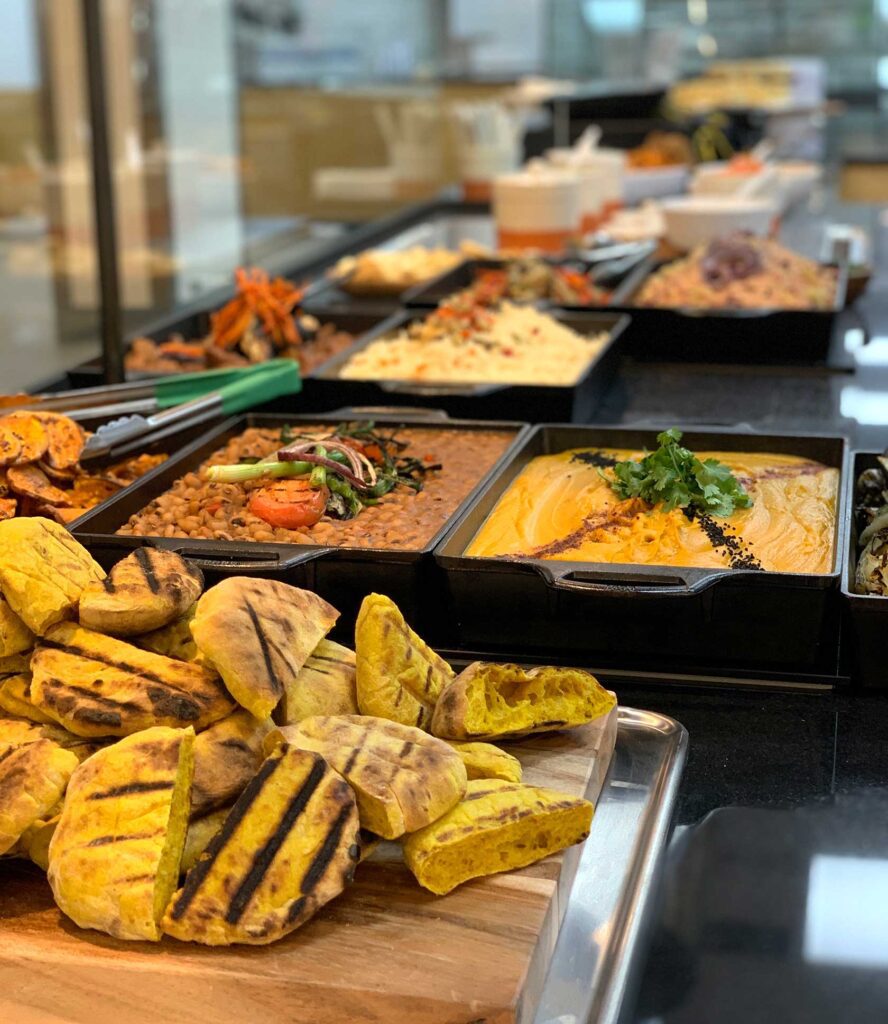Nubian Markets serves up Afro-diasporic eats and community connection in Roxbury

Nubian Markets, a café, halal butchery and grocery store that opened in Nubian Square in May, is a business built to reflect and serve the Roxbury community. The café serves a menu inspired by the flavors of the African diaspora, the grocery shelves are lined with products from Black- and brown-owned businesses and the café dining room transforms into a community meeting space.
Owners Yusuf Yassin and Ismail Samad, who is also the chef, founded Nubian Markets to address lack of access to both halal products and to fresh, healthy food in Roxbury. Yassin is East African and Muslim, and Samad is African American and Muslim. In the Nubian Markets concept, they found they could address both challenges in the community under one roof.
“There is no halal store in the neighborhood. So most of our community members would drive all the way to Revere, some of them as far as New Hampshire and Connecticut to source halal meats and halal products,” says Yassin. “And in Roxbury, also in the immediate Nubian Square neighborhood, there are very, very few grocery options.”
Boston Medical Center, LEAF Fund, Massachusetts Housing Investment Corporation (MHIC) and Conservation Law Foundation’s (CLF) Healthy Retail and Commerce Fund all contributed to funding the project. In the initial project plan, a group out of Washington D.C. called Good Food Markets was meant to build out the space, but the pandemic closures made it impossible for them to proceed. That’s when Yassin and Samad stepped in to create a market that would address the access to fresh and healthy foods in the neighborhood and also keep the space locally owned.
Inside the market, brightly colored produce is stacked in wooden displays and the grocery aisles display products like fufu mix and fonio, a variety of millet. Local Black-owned businesses like Hapi African Gourmet and Yamacu Ginger Drinks are highlighted in the store as are fresh produce and other ingredients grown on Black-owned farms.
In the café, dishes like a jerk chicken bowl and chickpea peanut stew reign. “We separate our menu with six different regions,” says Samad. “We have a north region of the continent, west, east, central, south and that sixth region is the diaspora, those people who were pulled away from the continent, but are still connected in spirit and with traditions to the folks who are still there.”
The menu is meant to underscore the breadth of flavors and food styles in both the Muslim world and the African diaspora. Samad uses harissa from North Africa, black-eyed peas from West Africa, a peri peri chicken recipe from South Africa and collard greens and sweet potatoes from his own African American upbringing. Now Samad is working on the fall menu, which will feature seasonal ingredients like corn and squash in comforting soups and stews.
The menu isn’t the only component of the business that reflects Samad and Yassin’s Muslim faith. While constructing their contract with LEAF Fund, the Nubian Markets owners requested that LEAF remove the interest and that a return on investment be paid in another way. Samad explains that it goes against Muslim law to engage in a business enterprise that benefits one person and not another, interest falls in that category.
“The goal was to bring in something that was culturally pertinent to the community and that was going to come in with affordable prices,” says Jose Luis Rojas, chief operating officer at LEAF Fund. “We were key in helping make that adjustment to their documents to make that happen.”
Boston Medical Center was one of the primary lenders to Nubian Markets, contributing $1.9 million to the project. For BMC, investing in the market was a choice that directly impacts the work at the hospital.
“Our patients are often challenged to really benefit from the excellent care we provide…. [O]ften they are challenged to be able to access healthy, affordable foods,” says Dr. Thea James, the vice president of mission and associate chief medical officer at Boston Medical Center.
James says that patients are often so focused on trying to survive, to get access to food, shelter and employment opportunities, that they can’t allocate the time and energy needed for their health. Having opportunities for increased food access and community connection in the Roxbury neighborhood could be a game changer for patients.
“We expect the impact of this to be for the levels of chronic disease to decrease significantly over time,” says James. “That’s our ultimate goal in this entire thing.”
Modeling financial security in a community-oriented and locally owned business is a goal as well. The store is called Nubian Markets, plural, for a reason. The ultimate goal is to have more of this type of market throughout the Boston area and beyond. Individual, local ownership of these stores would help build generational wealth within the community.
For now, Nubian Markets will continue providing the Roxbury neighborhood with fresh halal meats, piping hot harissa lamb sandwiches and an essential community meeting ground.








